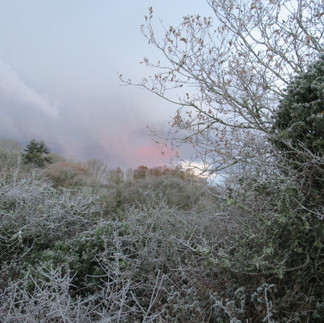December 2022
- Carolyn Thompson

- Feb 8, 2023
- 4 min read
I left the month of November fearing about the warmth of our Winter, and then December arrived and with it the cold, the hail and the snow. It felt good to see and to feel the ice cold winds on my face. It felt right. More treats followed as early in the month the Full Cold Moon greeted us on a clear dark night, surrounded by thousands of stars of all sizes. We are not in a dark skies area - more's the pity - as the naval base at Culdrose which borders The Lizard, emits a low glow from that direction, courtesy of all the security lights and cuts out all hope of a dark sky. However, if we look to the south, the sky turns a dark inky blue and we are witness to regular stunning night skies with constellations too many for us to know and name - well, that's my excuse.
The Cold Moon was named by the Mohawk tribe from America many moons ago and is self explanatory. Tribes named the moons after certain features in each of the seasons. Other names include: Drift Clearing Moon, (Cree): Frost Exploding Trees Moon, (Cree): Moon of The Popping Trees, (Oglala): Hoar Frost Moon (Cree). And here in Pagan Europe, the December moon was called, 'Moon Before Yule', which is nowhere near as evocative in its imagery as the names from the Native Americans, but it marked the coming of the Yuletide Festival celebrated on the shortest day of the year - the Winter Solstice. I have no idea of what was going on in the Cree lands but I love the idea of the frost exploding trees.
"Winter is the time for comfort, for good food and warmth, for the touch of a friendly hand and for a talk beside the fire: it is the time for home", according to the writings of Edith Sitwell. Certainly when the land is covered in snow and ice coats the roads, it is a time to be inside. There's no jobs we can do on the land and the quiet that accompanies snowfall is a moment of special silence, a moment for reflection in amongst the mad chaos of the world that beats at the door. I'm aware of the luck I have to live without fear of cold and hunger and I know that this year in the UK, the sixth richest country in the world, people will die from lack of heat and from starvation. It is a man made tragedy that shames us all. It is important to remember, it is a tragedy created by people with a so called 'good education', apparently intelligent and always wealthy. It is not created by the workers of this country, or the poor or the supposedly 'uneducated'. We could probably do with reassessing what is considered to be a good education.
And so to the birds. This is the month they get communal. The murmurations of the Starlings are well known but Jackdaws do regular flybys across our fields in their hundreds, feeding and roosting in large numbers. Their collective name is a 'clattering' or 'train' of Jackdaws'. They do have a tendency to nest in chimneys and because of this they can be viewed as a problem bird. If you have ever had to remove a Jackdaw that has fallen down a chimney and is terrified of everything, the word 'problem' does seem particularly apt. I looked up other collective nouns for different birds, I don't know who is responsible for the naming but he or she clearly had an emotional response to these feathered creatures: a charm of finches: a bellowing of bullfinches: a cloud of blackbirds: a herd of curlews and that most apt of descriptions, a parliament of crows. Obviously didn't favour the curlews.
I watched a Redwing on the ground in our kitchen garden, posing in the midday sun. It's rare to find one on its own and it is the first time I have been so close and its reddish feathers and markings were clear to see. It pecked away and rummaged around in the grass and along the hedge. For at least half an hour I was given time to spend with this bird, whatever it was looking for, I hope it found it. Fieldfares are also gathering in numbers and in the early evening are dotted all over the field. These two are part of the family of Thrushes. There are dozens of species worldwide but only six that we see in the UK and the Blackbird is the only one that is not on an endangered list (RSPB). Incase you were wondering, as indeed I was, the collective noun is a 'hermitage' of Thrushes. The sighting of the Redwing was new to me but further along the coast, off The Lizard, even more unusual sightings were reported; that of an adult and a juvenile Humpback Whale. Whilst it must have been a magical sight, Cornwall Wildlife Trust issued a sobering statement, 'it's clear our oceans are under immense pressure from development, pollution, fishing, climate change and recreation'. The presence of these magnificent beasts in our local waters was not a good sign. And the collective nouns for Humpback Whales? A herd, (along with the curlews), a gam, a pod or a school. If, like me, you were wondering about the word 'gam', it is a 'visit or friendly conversation at sea or ashore especially between whalers', or 'a school of whales'. I like the idea that it's a friendly conversation between humans and whales but I have to accept that the whales probably don't see it that way.
Details of the word 'gam' was supplied by merriam-webster.com







Comments